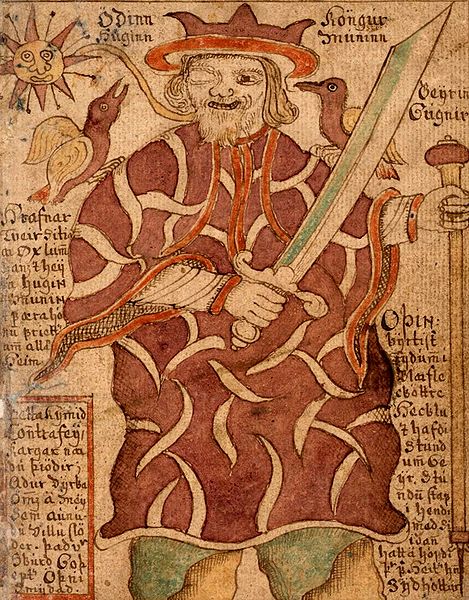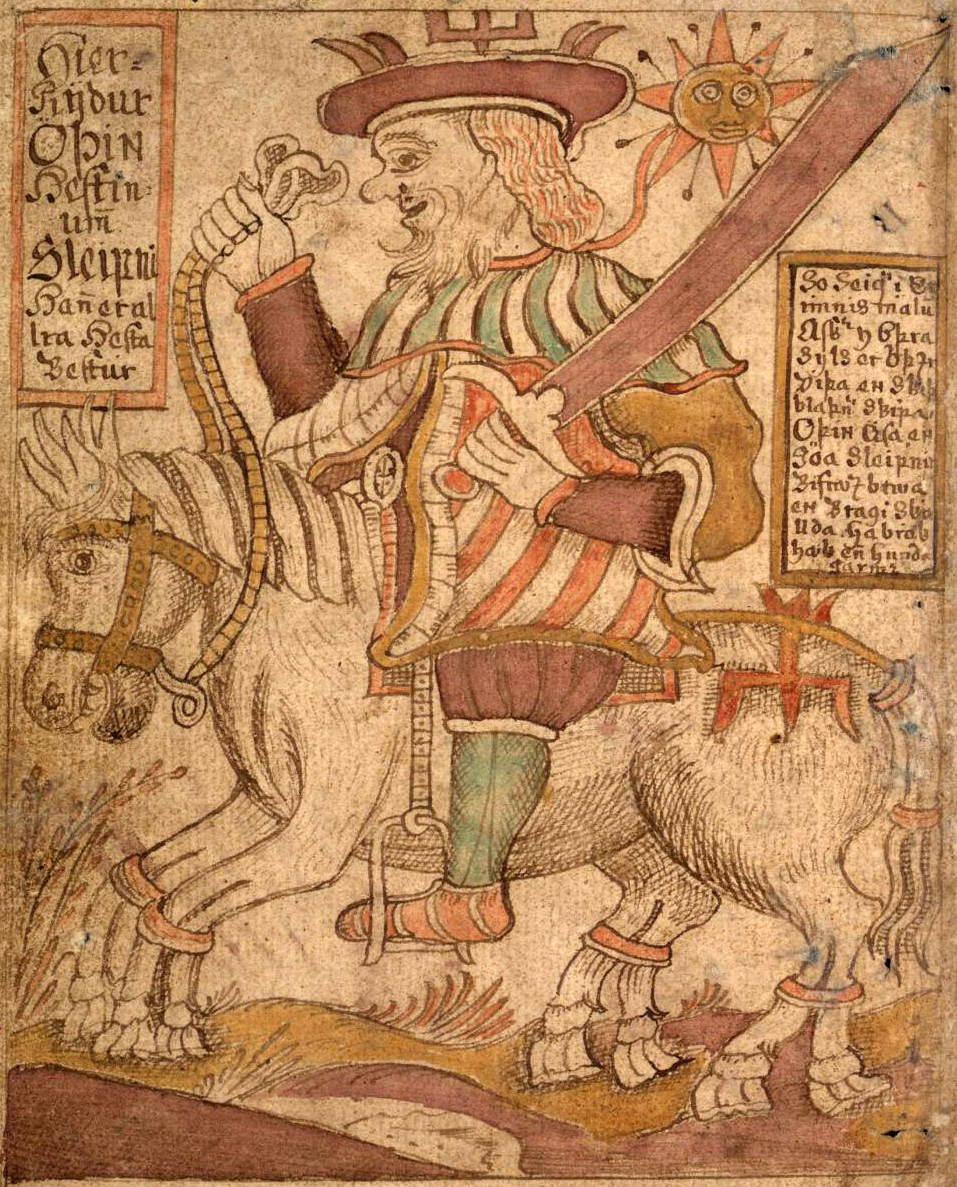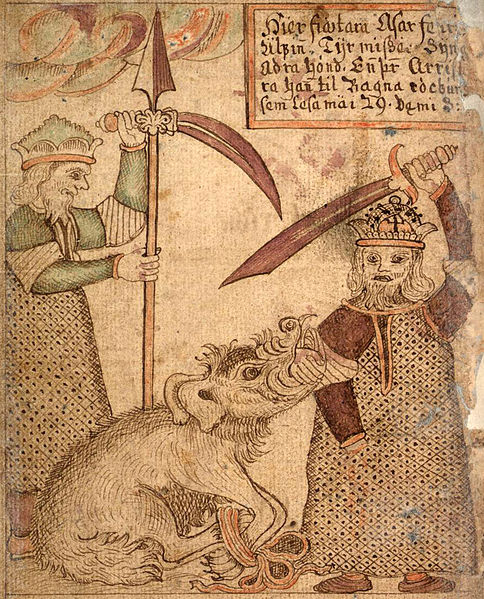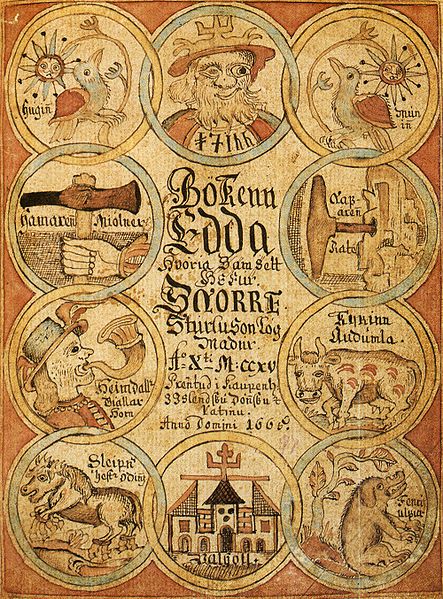King Arthur is not the only legendary figure used to legitimize rulership in medieval England. Long before Geoffrey of Monmouth’s 12th century Historia Regum Britannium, the most influential mythic ancestor of the English people was Woden.
Woden is presumably derived from a common god of the pre-Christian Germanic peoples and is often identified with the pagan god Oðinn, who was worshiped in early medieval Scandinavia and called the Alföðr (“Allfather”) in Old Norse. This legendary figure was later understood to be an ancestral chieftain from whom the Anglo-Saxon kings claimed descent and thus the authority to rule in England.

Woden remains an obscure and enigmatic figure in the extant written records from early medieval England. Like Oðinn, he is often understood in surviving narratives as a deified chieftain who becomes the godhead of the Norse pantheon. It is impossible to tell precisely how analogous the Anglo-Saxon chieftain Woden and the Norse god Oðinn might have been by the time the Angles, Saxons and Jutes invaded, conquering the once Roman island of Britannia. Scholars have debated the role and significance of these respective pagan deities and their potential relationship with each other.
Woden, from Bede’s Historia Ecclesiastica and a medical charm with Odinic parallels from the so-called Lacnunga (found in British Library Manuscript Harley 585), seems to be a warrior-god; however, the sparse evidence undermines any clear portrait of this mythic figure. Ælfric, Abbot of Eynsham, (whose homilies are preserved in four extant manuscripts) composed a 10th century sermon titled De falsis Diis “Concerning false gods” that contains a fairly involved discussion of the gods, equating them to figures in the Roman pantheon, likening Woden to Mercury. Woden weirdly makes his way back to Iceland, via Ælfric’s sermon recorded in the 14th century Hauksbók (Icelandic National Library, AM544 4to). Wulfstan II, Archbishop of York, later expands on Ælfric’s work in his 11th sermon by the same name (found in Bodleian Library, MS Hatton 113).

More regularly attested and clearly defined is the Norse god Oðinn, who is associated with runic wisdom and reigns in Valhalla (The Hall of the Slain). One-eyed Oðinn rides on his magical, eight-legged horse called Sleipnir, and according to surviving Icelandic literature from the 12th century onward, he will battle the wolf Fenrir, child of Loki, during the final apocalyptic battle known as Ragnarǫk.

Oðinn is featured throughout Norse literature in texts such as Snorra Edda or Prose Edda, written by the famous Icelandic author Snorri Sturluson in the early 13th century, which survives in seven extant Icelandic manuscripts some from as late as the 18th century such as SÁM 66 (housed at Stofnun Árna Magnússonar), ÍB 299 4to (housed at the Icelandic National Library) and NKS 1867 4to (housed at the Danish Royal Library). The anonymous collection of so-called eddic poems, often referred to as the Elder Edda or Poetic Edda (and located in Reykjavík, Stofnun Árna Magnússonar, GKS 2365 4to—pet-named “Codex Regius”), is another wealth of Odinic knowledge. This collection begins with the famous Old Norse poem Vǫluspá, in which a prophetic vǫlva (“seeress”) describes the creation and end of the world to Oðinn.

But in post-conversion England, Woden was not usually considered to be the father of the gods. More often, he was viewed as the ancestral patriarch English royal lineages. Check back next week for more on this enigmatic figure!
Richard Fahey
PhD Candidate
Department of English
University of Notre Dame
Special thanks to Tim Machan for his contributions to this post.
Further Reading:
Abram, Christopher. Myths of the Pagan North. Continuum, 2011.
Meaney, A L. “Woden in England: a reconsideration of the evidence.” Folklore 77.2 (1966): 105-115.
North, Richard. Heathen gods in Old English Literature. Cambridge: Cambridge University Press, 1997.
Rowsell, Thomas. Woden and his Roles in Anglo-Saxon Royal Genealogy. Medievalists.net, 2012.
Primary Sources mentioned concerning Woden/Oðinn:
Orchard, Andy. The Elder Edda. Penguin Classics, 2011.
Sturluson, Snorri. Edda. Anthony Faulkes (trans and ed). David Campbell Publishers, 1987.
Wulfstan. Homilies of Wulfstan. Dorothy Bethurum (ed). Oxford University Press, 1957.
